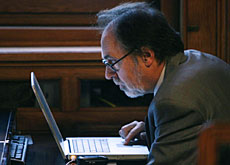Swiss may have known about secret CIA prisons

The Swiss intelligence community has allegedly been aware of secret CIA prisons in eastern Europe for nearly two months, according to leaked documents.
The intelligence services are refusing to comment on the affair, revealed at the weekend by the SonntagsBlick newspaper.
Swiss parliamentarian Dick Marty, who is investigating the prison claims for the Council of Europe, played down the significance of the leaked document.
According to the SonntagsBlick, Swiss military intelligence intercepted a fax received by the Egyptian embassy in London supposedly confirming the existence of the detention centres.
The message was picked up by the secret service’s Onyx satellite listening system on November 10, just three days after the Council of Europe launched its investigation into allegations that the CIA was running secret interrogation centres in Europe.
The non-governmental organisation Human Rights Watch had claimed shortly beforehand that American intelligence services were interrogating suspected members of Osama bin Laden’s al Qaeda network at these centres.
The NGO also claimed that American planes had carried prisoners from Kabul to Polish and Romanian military facilities on at least two occasions.
The Egyptian fax stated that 23 Iraqi and Afghan citizens had been transferred to a Romanian military base near the port of Constanza for interrogation purposes. It added that similar detention centres had been set up in Ukraine, Kosovo, Macedonia and Bulgaria.
Leak
The SonntagsBlick’s story is based on a document leaked from military intelligence. The complete contents of the report are classified as “secret”.
Jean-Blaise Defago, a spokesman for the defence ministry, declined to comment on the contents of the document, saying only that the authorities did not know how the newspaper had got hold of it.
He told swissinfo that Defence Minister Samuel Schmid had ordered an inquiry and confirmed that legal steps were being considered.
The parliament’s control committee, which oversees military intelligence, has been informed of the leak.
Dick Marty, who is leading the Council of Europe’s investigation into the prison allegations, is cautious about the SonntagsBlick’s revelations.
“I cannot say whether this is an authentic document, and furthermore the fax relays information confirming things we already knew,” he told swissinfo.
“But it seems inappropriate to me to talk of absolute proof. It is the kind of scoop I was expecting to see and I’m sure there will be plenty more.”
Marty believes that if the document turns out to be authentic, it will be further proof that some governments in Europe are not revealing everything they know.
A more pressing concern in his view is how the document came to light.
“How is it that the Swiss intelligence services are intercepting messages between Cairo and the Egyptian embassy in London?” he asked.
“Or is it another foreign [security] service that passed on the information to Switzerland and then to the SonntagsBlick?”
swissinfo, Scott Capper
Switzerland launched the Onyx system in 2000 to monitor satellite-borne international civil and military communications, including internet traffic.
It is a more limited version of the US “Echelon” system.
Like Echelon, Onyx interception is carried out with software filtering the content of satellite communication for specific keywords.
Onyx is based at three sites: Zimmerwald and Heimenschwand in canton Bern and Leuk in canton Valais.
Switzerland may have been involuntarily involved in the secret prison affair because of CIA flights and landings in Swiss airspace and territory.
The Swiss authorities have asked Washington for explanations about four landings at Geneva airport and 30 flights in Swiss airspace.
The Federal Prosecutor’s Office has also opened an investigation.

In compliance with the JTI standards
More: SWI swissinfo.ch certified by the Journalism Trust Initiative











You can find an overview of ongoing debates with our journalists here . Please join us!
If you want to start a conversation about a topic raised in this article or want to report factual errors, email us at english@swissinfo.ch.